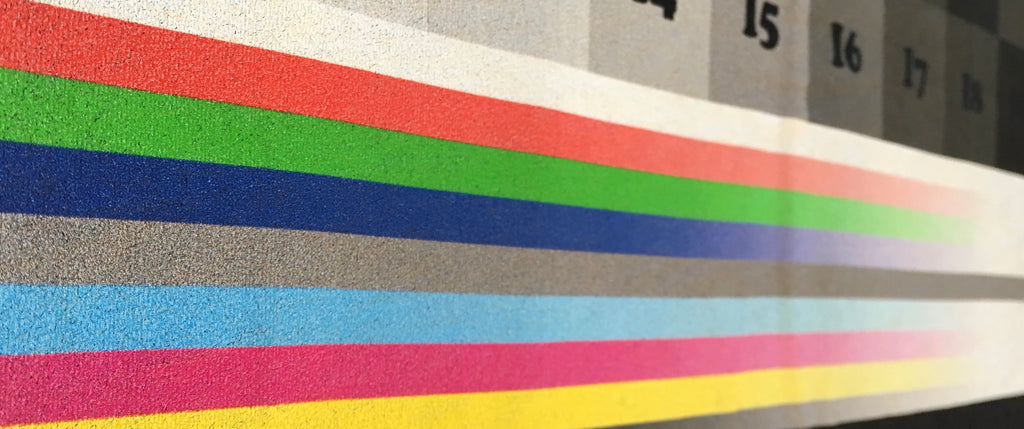Direct To Garment - DTG

Summary
Direct To Garment, also known as DTG is the process of printing liquid garment ink directly onto the fabric or garment. These inks are typically designed for printing onto cotton and some machines don’t have white ink so are only suitable for printing directly onto white/light garments with a high cotton content. Once the ink is printed, it is cured using heat either directly applied using a heat press or the printed garment is placed in a drying unit.
For darker garments, a pretreatment solution needs to be applied/sprayed onto the area to be printed which is a water based salty glue mix. This helps the white underbase ink adhere to the garment for great durability. Larger more expensive DTG machines are loaded with a thick, gloopy white ink made from titanium dioxide which is laid down first as a white underbase on dark garments so when the colour inks are printed on top they appear bright and vibrant. Without a white underbase, DTG garment inks printed onto dark substrates simply wouldn’t be visible.
This is a great method for decorating garments and the printed graphic has a durable stretchy rubbery feel which lasts as long as the garment, typically one to two years. While good t-shirt design ought to have negative space (areas which aren’t printed and the garment colour shows through to form part of the design) it is possible to print larger areas using DTG without any major deterioration of the print over time.
Get in touch with us if you need some DTG printing done.
Issues
Most of the issues with DTG printing fall to the printer owner/operator rather than the end user. The white ink machines are notorious for clogging and needing very regular agitation to stop them settling and blocking the ink lines. Maintenance cycles are required regularly and rigorously and due to the amount of maintenance required, these machines need to be printing shirts all day long to justify the time required for maintenance and ink wasted from maintenance cycles.
If a pretreat solution hasn’t been applied properly, meaning the correct amount in a consistent coverage for the area to be printed, then there could be some issues with the print flaking/cracking after some washing. Always ensure you are ordering from a reputable provider.
DTG Requirements
- Machine - Specially designed DTG printer
- Transfer Media - None required as printed straight onto the garment
- Print Size - Machine specific, some can print A5/A$ size and other upto 400x600mm or more Process (for dark garments) - Pretreat applied, cured, white underbase printed, colour ink on top then cured
- Process (for light garments) - Sometimes pretreat is used but other times the colour ink is printed straight onto the garment and cured afterwards - No white ink is used.
- Substrate Type - Fabric with high cotton count, 100% is best for the waterbed inks but cotton/poly blends down to60/40 split can also be DTG printed
- Equipment - Pretreat sprayer/machine, DTG printer, Heat press to suit the size & shape of the design on the substrate and optional dryer unit.
- Substrate Colours - White/light garments for machine with no white ink, any colour for machines with white ink capability.
- Ink Colours - Full-Colour CMYK (Cyan, Magenta, Yellow & Key/Black) plus White ink for machines that have it.
- Cost of Media - Medium. Ink can be expensive depending on the machine and how much the machine is used.
- Suitable Artwork - Perfect for full colour, blacks & whites for machines that have it. Reasonable detail levels are possible and this process is suitable for large print areas too.
Get in touch with us if you need some DTG printing done.

Let customers speak for us
from 810 reviewsPrint was delivered quickly. There was a minor issue but Phill reached out to me BEFORE I had even raised it and offered support - I think that's a sign of real care and attention. Excellent customer service. I will be ordering again!

Great product supporting an important cause.

Great product supporting an important cause.

Great t-shirt. delivered on time and as expected

Great badges Thanks Love the designs

This is a great quality t shirt.

Great thanks, Top Quality Badges

Very good service and product was spot on well done you

This is a great tee shirt with fantastic design on. Comes up small so I sized up but all good!

I apsolutly love this bag. Its very well made and i can get loads in it. And the words just sum me up completely. I want the tshirts next .

I had some tiny water slide decals printed for a very niche model ship project I’ve been working on, and they arrived so quickly and exceeded my expectations! They are VERY small but lost no detail, and they’ve absolutely elevated my model of the “Oceanos” ship which now features the appropriate nameplates, helping to sell the small scale of the ship.

Ordered photos on a waterslide decal and they were absolutely perfect. Phil also gave me different options of size. very happy would recommend and will be using again for definite

Self-Printable CMYK Colour Wheel Print Test Chart, Digital File Download Only for Printer Colour Testing, Print Your Own Color Wheel

Great product and Customer Satisfaction all around! Thank you!

